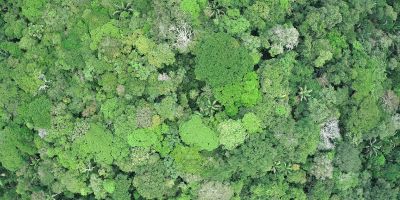New book addresses rewilding myths and misunderstandings

Professor Steve Carver wrote a chapter of the book, which debunks misconceptions about rewilding from a range of perspectives.
Professor Carver is one of 14 authors in the collection which was edited by Ian Parsons.
‘Great Misconceptions: Rewilding Myths and Misunderstandings’ aims to clarify and evaluate the use of the term ‘rewilding.’
As rewilding has become more common and well-known, so has misinformation and misunderstanding around it—both intentional and not.
The authors address these myths head-on, explaining why they are incorrect and how to reclaim the narrative.
Rewilding in the UK – it's not too small
Professor Carver’s chapter focuses on the misconception that the UK is too ‘small and crowded’ to restore its nature and wildlife – often shared by people who don’t like the idea of rewilding.
He uses his geographical and Geographic Information Systems (GIS) expertise to respond to this claim.
For example, he clarifies that Great Britain is the largest island in Europe and 9th largest island in the world.
On top of this, most people in the UK live in towns and cities, so over 90% of the country has a population density of less than 1 person per square kilometre.
Identifying the ideal areas to rewild
Another clarification Professor Carver makes is that rewilding doesn’t mean everywhere.
The COP15 Kunming-Montreal Agreement sets targets to protect 30% of land, sea and water and to restore 30% of degraded areas.
Professor Carver uses spatial data on population density, land cover, agricultural land capability and margin land to find the top 30% wildest land across the UK.
This data, alongside maps of wild land quality developed in the Wildland Research Institute at the University of Leeds, shows opportunities for rewilding based on remoteness, naturalness and marginality.
These are key to the IUCN Commission on Ecosystem Management’s 10 Guiding Principles of Rewilding, which Professor Carver co-wrote.
The principles acknowledge ecological and societal needs, including local support and traditional ecological knowledge.
Professor Carver said: “Those opposed to the idea of rewilding seem to think we want to rewild everywhere. That’s just silly as we need places to live and need to protect our best quality agricultural land to grow much-needed food.
“What we are suggesting is that given the developing climate and biodiversity crisis, we need to look beyond business as usual, and set aside some of our unproductive land for nature and, in doing so, secure ecosystem services that delivery benefits for both humans and wildlife.”
Range of perspectives
The other chapters include authors from conservation, politics, farming, business, academia and activism.
They cover a range of topics from rewilding cities, reintroducing animals, land management, community engagement, sustainable food systems and more.
The book aims to inform and stimulate conversation about rewilding, sustainability and conservation.
Editor Ian Parsons said: "This book came about due to frustration at how the word rewilding is often misused, it can be a label for conservation projects, but it can also be used to libel them as well!
“Great Misconceptions is a very different rewilding book because instead of being one person's view, it brings together a wide range of different people with different perspectives of what the word rewilding means to them, each one challenging a different myth, misunderstanding or misconception.
“From the outset I not only wanted this book to challenge those misconceptions, but I also wanted it to stimulate debate about them too."
The authors will come together as a panel in a webinar about the book on November 19th.




